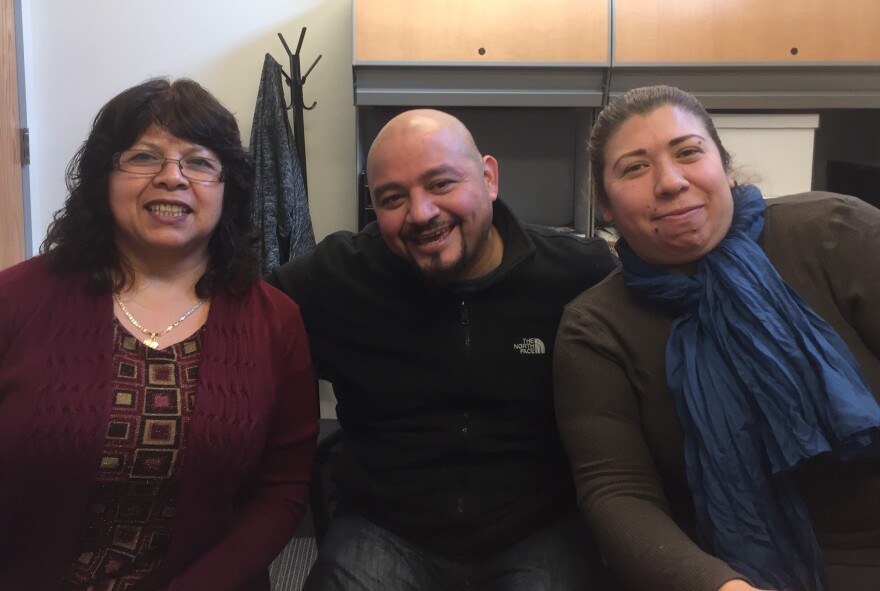The new Mexican Consulate in Milwaukee was formally inaugurated this afternoon. Among those taking part were Mexican Foreign Minister Claudia Ruiz Massieu and Gov. Scott Walker.
The consulate, located at 1443 N. Prospect, will provide services for Mexican nationals, such as help in procuring legal documents.
Original story from February 16, 2016:
People from Mexico who live in Milwaukee may need services from the Mexican government from time to time. For instance, help with getting a birth certificate. Soon, they'll be able to obtain such services more easily. That’s because Mexico is opening a full-service consulate here.
It will be the first such operation in Wisconsin, and it’s a big deal, according to Nancy Hernandez.
“A consulate actually is a part of the Mexican government that resides here,” Hernandez says.
Hernandez is a Milwaukee businesswoman who helped push for a Mexican consulate here. She says it was a lengthy process, which required buy-in from Wisconsin’s state and federal lawmakers.
“For a foreign country to put a consulate anywhere in the United States requires them to petition our federal government and ask for permission to do so, because it has full diplomatic status as part of the Mexican government,” Hernandez says.
Hernandez says Mexico wanted to set up a consulate here, because Wisconsin has a rapidly growing population of residents of Mexican descent. UWM anthropologist Javier Tapia puts the number at more than a quarter million. He says sometimes they need help from consulates.
“They provide a number of services, including passports, birth certificates from Mexico, as well, for example, when people want to travel to Mexico, they will be able to get their automobile permits instead of waiting in the border to pick up the documentation,” Tapia says.
Those who retain Mexican citizenship will also be able to visit the consulate to cast ballots in Mexico’s elections.
The office is expected to open on the city's east side in March. More than 30 full-time staff expect to serve up to 400 clients a day.
Some will come from Centro Hispano, a social services agency on the near south side. ZayraViveros is taking an English class there. She says having a local consulate will save her a trip to Chicago that’s where the nearest office is located.

Toni Rivera-Joachin, who runs Centro Hispano, says having to travel to Chicago can be long and challenging for some of her clients.
“If you can imagine being an immigrant family that's up in northern Wisconsin and having to take that long drive down to Chicago, and then going from the very rural area into a very urban area, can be pretty troublesome for some of our families,” Rivera-Joachin says. She adds there are often long lines at the Chicago office.
“The amount of time that it takes in order to get an appointment to get into the consulate is months. Hopefully here we can lessen what Chicago experiences by having our Wisconsin residents be able to come to Milwaukee,” Rivera-Joachin says.
It's not just people of Mexican descent who are eager for the consulate to open here. So are companies that want to do business with Mexico. The office will help facilitate relationships with firms that want to export or expand there. Mexico is Wisconsin’s second-largest trading partner.
Honorary Consuls in Wisconsin Also Provide Services
In addition to the Mexican consulate that will soon open in Milwaukee, a number of other countries are represented in Wisconsin by individuals who serve as "honorary consuls." They are volunteers who provide some of the same services as a consulate, yet on a smaller scale. We asked several about their duties.
Honorary Consul of Belgium, Elisabeth Townsend Bridge, says duties vary, depending on the country represented. The responsibilities may change, over time:
"I was previously involved with visa processing, particularly in circumstances where Wisconsin students were traveling to Belgium universities to study for longer periods than the usual tourist visit. Several years ago, I helped sponsor and host a meeting at my firm involving trade representatives/career diplomats in Chicago from various nations who wanted to learn more about The Water Council and the research and economic development happening in Wisconsin."
Honorary Consul of Denmark, AnnemarieSawkins, Ph.D., is currently working with a Danish company that's looking to expand to Wisconsin. She says one of the key roles she plays is to facilitate business introductions for such companies:
"We are the people that are on the ground with the connections, with the networks that are helping the Danes know who to talk to and who to be connected to when they come to visit or if they need information on what's going on in the state. The Danes are doing really interesting things in technology and wind power so it's gratifying to see them bring that expertise and energy to the U.S., and I'm proud of it."
Honorary Consul of Sweden, Johan Segerdahl, says the job also includes setting up a place for Swedes living temporarily in Wisconsin to vote for elections back home. His office in downtown Milwaukee serves as a site for both Swedes and Danes to vote; he shares office space with Honorary Consul of Denmark AnnemarieSawkins:
"We are a voting booth both for Danish and Swedish elections, And there's the European community stuff that happens as well. You have to remember, a lot of the elections in these different countries, participation is in the 90th percentile."
Segerdahl adds that another function of honorary consuls is to provide assistance to Swedes abroad, in case of an emergency:
"Sadly, the world has become a less safe place than 10-15 years ago, and as a result, consuls have had to take a different role around the world. They have to be much more focused on protecting their specific populations in case of a tragedy -- a natural disaster or some crime, terrorist activity."
Segerdahl says that could mean taking an active role in seeking medical care, legal support, food or transportation for Swedes abroad.




